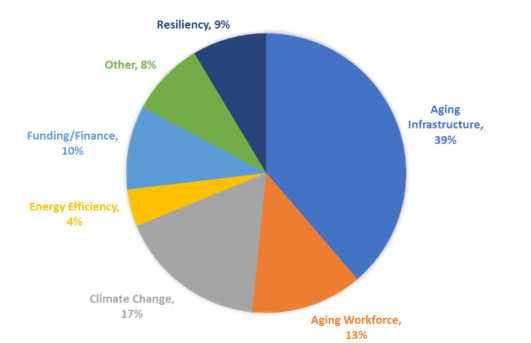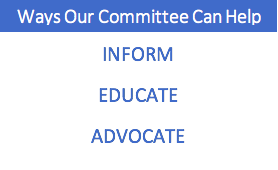The Sustainability Committee recently completed (February 2019) an informal survey of NEWEA members to better understand how the membership views sustainability, and what our committee can do to further promote sustainable principles and practices within the wastewater community and NEWEA’s membership. The eight-question survey included the following five sustainability-focused questions:
- How would you describe a sustainable utility, process, or approach? (Q4)
- What are the most pressing sustainability topics facing our industry in New England today? (Q5)
- What obstacles do utilities face in becoming more sustainable in their operations? (Q6)
- How can NEWEA in general, and the Sustainability Committee specifically, help utilities overcome those obstacles? (Q7)
- How can the NEWEA Sustainability Committee most effectively serve the organization’s, membership? (Q8)
Key Results from the Sustainability Survey
Just over 65% of respondents described a sustainable utility/process/approach as one that “meets the needs of the present without compromising the ability of future generations to meet their own needs” (Q4). This definition for sustainability was published over 30 years ago by the United Nations Brundtland Commission and is recognized internationally as the foundation to sustainable practices and principles. We are encouraged that many within NEWEA still define sustainability using these words, indicating this particular definition has stood the test of time and is itself “sustainable”.
The most pressing sustainability topic facing our industry (Q5) according to respondents is our industry’s aging infrastructure (39% of responses). The question on pressing topics also received some interesting comments, including:
- Treating wastewater to meet more stringent requirements in an energy efficient manner
- A better understanding of the connection between the environment and the economy, and the need to decouple environmental decisions from economic ones
- Using the resources we have more effectively
- The need to develop trust among stakeholders and a methodology that enables people to think as a group because all the issues are urgent.
According to the responses to Q6, the biggest obstacle utilities face in becoming more sustainable in their operations is insufficient funding (49%) to support all desired and/or required projects and initiatives, followed by differing organizational priorities (20%). The combination of these two obstacles quickly becomes problematic for those communities lacking a clear vision of what makes a utility sustainable. Lacking support for more holistic thinking around environmental and social costs leads to a lack of support for projects that carry a slightly higher up-front cost.
“Take-Aways” for our Committee and NEWEA
Regarding how NEWEA and our committee could help overcome the above obstacles (Q7), respondents indicated we could advocate for more sustainability policies (33%) and funding (17%), as well as provide more assistance with public education (23%) and professional education (18%). One respondent noted that “it is important to help utility managers find tools to educate decision makers on the risk of running infrastructure to failure without funding.”
When asked how our committee can most effectively serve the membership (Q8), 90% of the respondents commented that communication and education should take top priority with an emphasis on topic-focused seminars and webinars. Several comments on how we can help also included:
- Funding a study estimating future rates based on infrastructure condition would help communicate funding/investment needs to local boards and committees.
- More direct outreach to local, state and national policy makers.
- Compiling data from New England communities that compares the age/condition of infrastructure vs. historical user charge rates and debt service burdens for use by local boards and committees.
The results of this survey indicate that there is an understanding within the industry of the meaning of sustainability, but that more needs to be done to educate the general public and public decision makers on the importance of integrating sustainable decisions at the local level. Thank you to everyone that responded – the Sustainability Committee will use your responses to help guide its activities in the near future.





No comments yet.